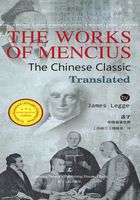
CHAPTER IV
1. Mencius said, 'If a man love others, and no responsive attachment is shown to him, let him turn inwards and examine his own benevolence. If he is trying to rule others, and his government is unsuccessful, let him turn inwards and examine his wisdom. If he treats others politely, and they do not return his politeness,


3. 四海,—'the four seas' i.e. All with them, as subject to the sovereign's jurisdiction. There is a special reference, however, to the sovereign's right to offer all sacrifices:—those peculiar to himself, and those open to others. 社稷,—'the spirits of the land and the grain', i.e. the spirits securing the stability and prosperity of a particular State, which it was the prerogative of the ruler to sacrifice to. Hence the expression in here used figuratively. See the LîChî, Bk. III. iii. 6. 2nd tone) 洒,—like the Hebrew idiom, Isa. v. 22. This
4. 恶,—the verb, in 4th tone, 'to hate, dislike'. 强 (in is spoken with reference to the princes of Mencius's time.
CHAPTER4. WITH WHAT MEASURE A MAN METES IT WILL BE MESURED TO HIM AGAIN, AND CONSEQUENTLY BEFORE A MAN DEALS WITH OTHERS, EXPECTING THEM TO BE AFFECTED BY HIM, HE SHOULD FIRST DEAL WITH HIMSELF. The sentiment is expressed quite generally, but a particular reference is to be understood to the princes of Mencius's time.
1. 反 is used in a manner common in Mencius,='to turn back from the course being pursued, and then to turn inwards to the work of examination and correction.' In the next paragraph, we have it followed by another verb, 求. In 治人, 治 is in 2nd tone, 'to regulate', 'to try to rule'; in 不治, 治 is in 4th tone, 'to be regulated', the government being effective. The clauses—爱人不亲, &c., are very concise. The paraphrase in the 备旨 thus explains:—为治者体仁以爱人,


let him turn inwards and examine his own feeling of respect.
2. 'When we do not, by what we do, realise what we desire, we must turn inwards, and examine ourselves in every point. When a man's person is correct, the whole kingdom will turn to him with recognition andsubmission.
3. 'It is said in the Book of Poetry,
"Be always studious to be in harmony with the ordinances of God,
And you will obtain much happiness." '